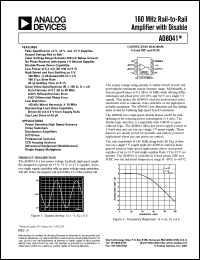|
|

|
|
| Partname: | AD8041AR-REEL7 |
| Description: | 12.6V; 160MHz rail-to-rail amplifier with disable. For power sensitive high speed systems, video switches, distribution amplifiers, A/D driver |
| Manufacturer: | Analog Devices |
| Package: | SOIC |
| Pins: | 8 |
| Oper. temp.: | -40 to 85 |
| Datasheet: | PDF (284K).
Click here to download *) |
The output voltage swing extends to within 50 mV of each rail, providing the maximum output dynamic range. Additionally, it features gain flatness of 0.1 dB to 30 MHz while offering differential gain and phase error of 0.03% and 0.03 on a single 5 V supply. This makes the AD8041 ideal for professional video electronics such as cameras, video switchers or any high-speed portable equipment. The AD8041's low distortion and fast settling make it ideal for buffering high-speed A-to-D converters. The AD8041 has a high-speed disable feature useful for multiplexing or for reducing power consumption (1.5 mA). The disable logic interface is compatible with CMOS or opencollector logic. The AD8041 offers low power supply current of 5.8 mA max and can run on a single 3 V power supply. These features are ideally suited for portable and battery powered applications where size and power are critical. The wide bandwidth of 160 MHz along with 160 V/s of slew rate on a single 5 V supply make the AD8041 useful in many general purpose high-speed applications where dual power supplies of up to 6 V and single supplies from 3 V to 12 V are needed. The AD8041 is available in 8-lead plastic DIP and SOIC over the industrial temperature range of 40C to +85C. 2 |
|

Click here to download AD8041AR-REEL7 Datasheet*) |
 |
| *)Datasheets downloading from ChipDocs is only for our members (paid service). REGISTER NOW for your membership. |
|
|
|

